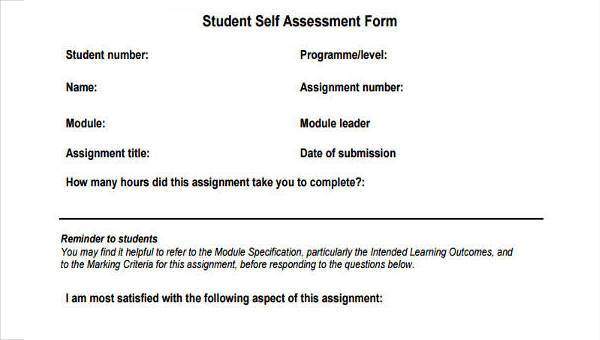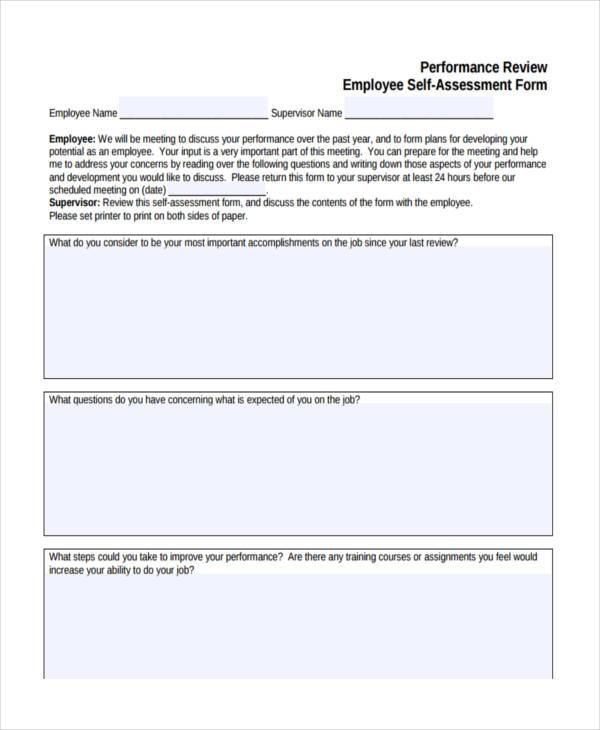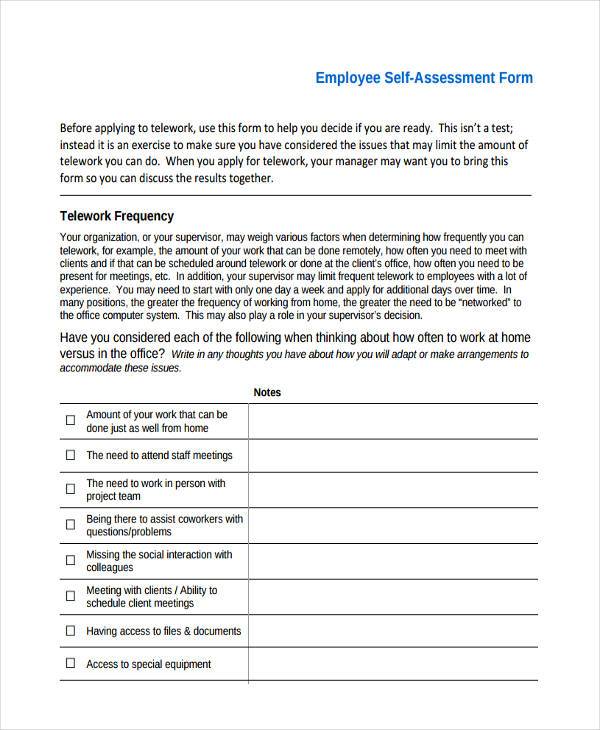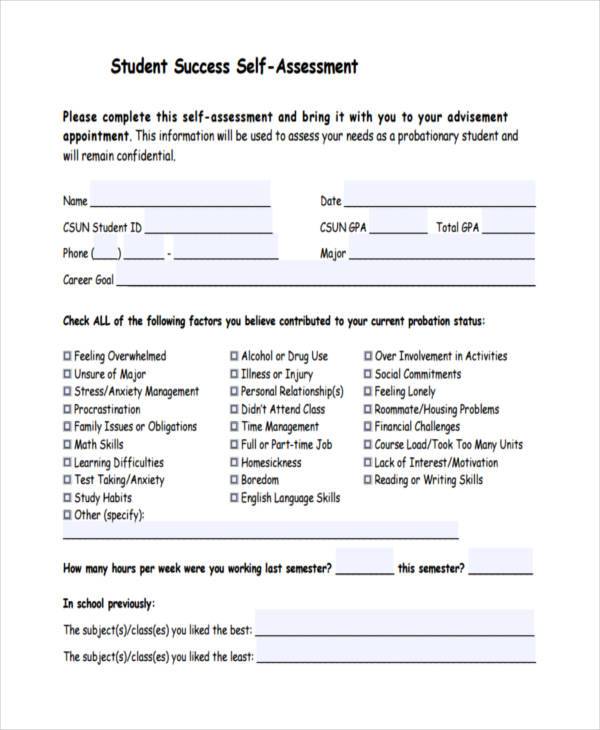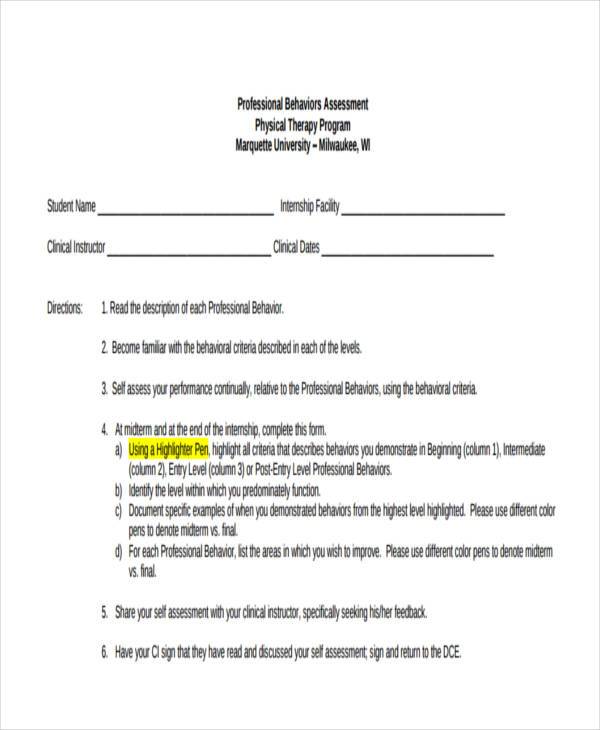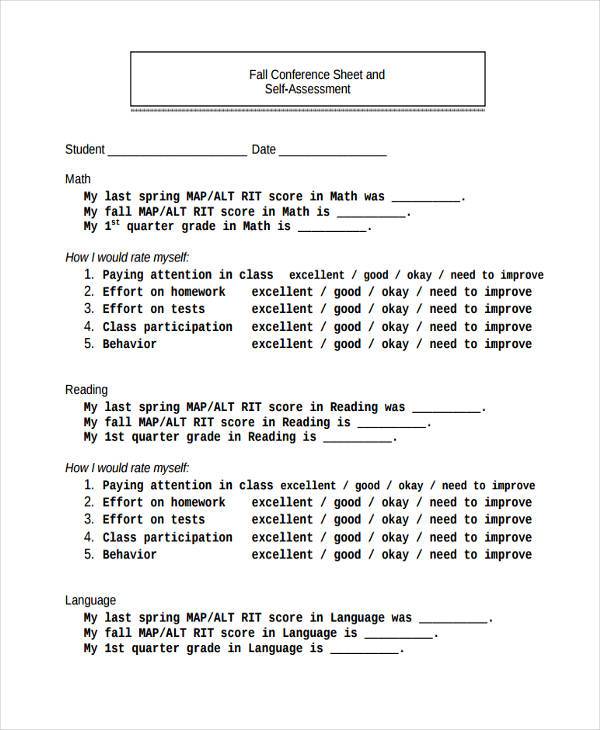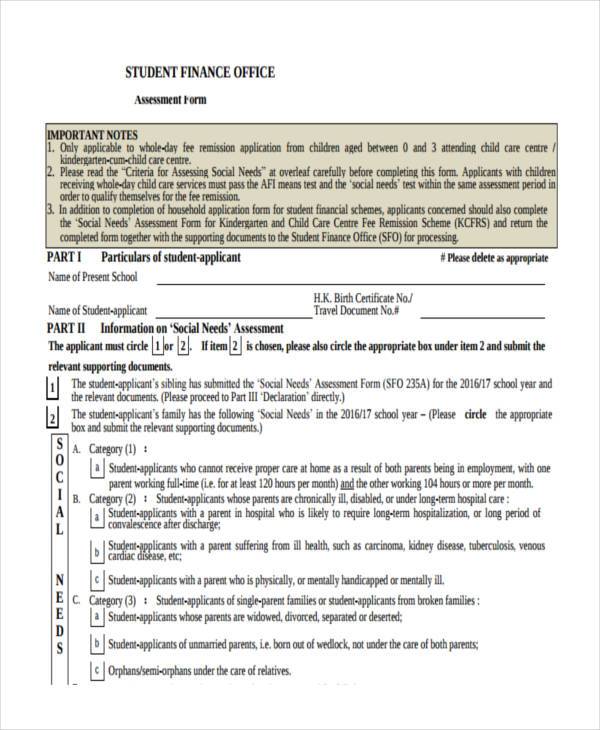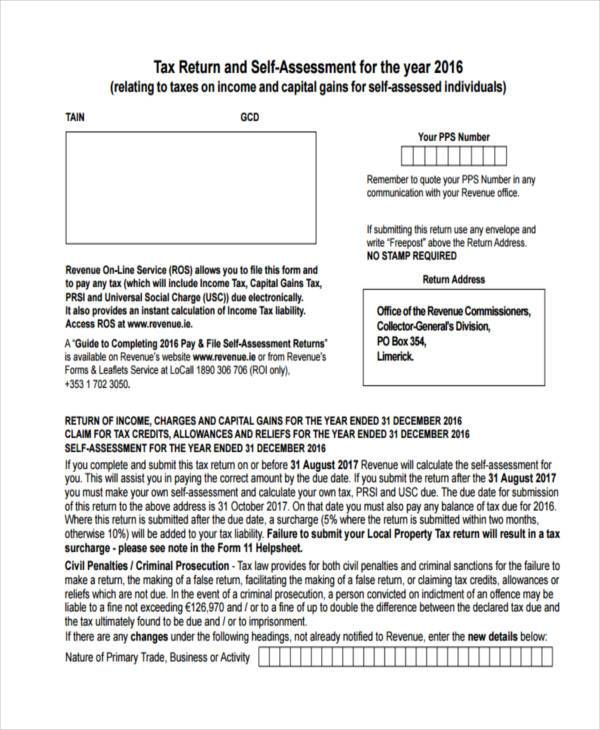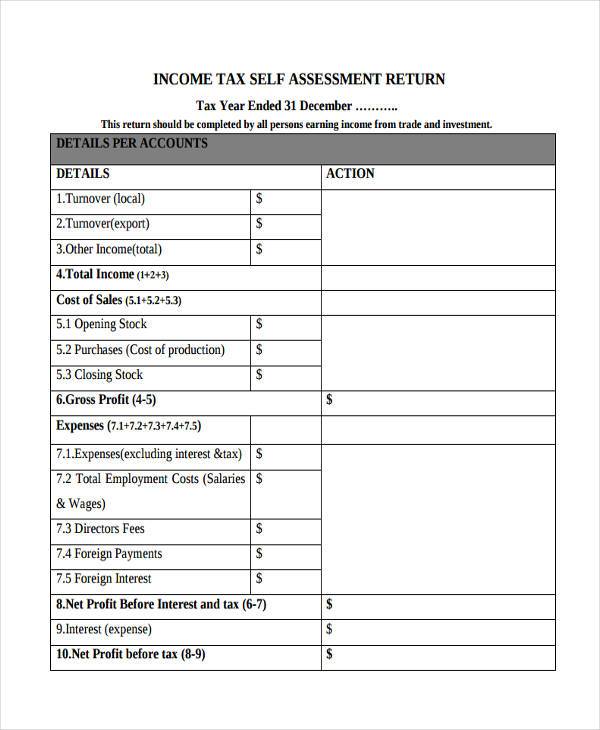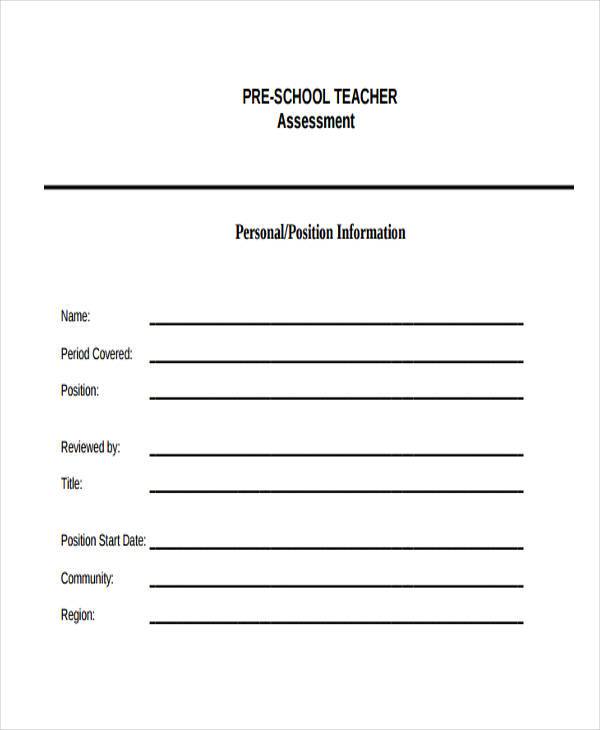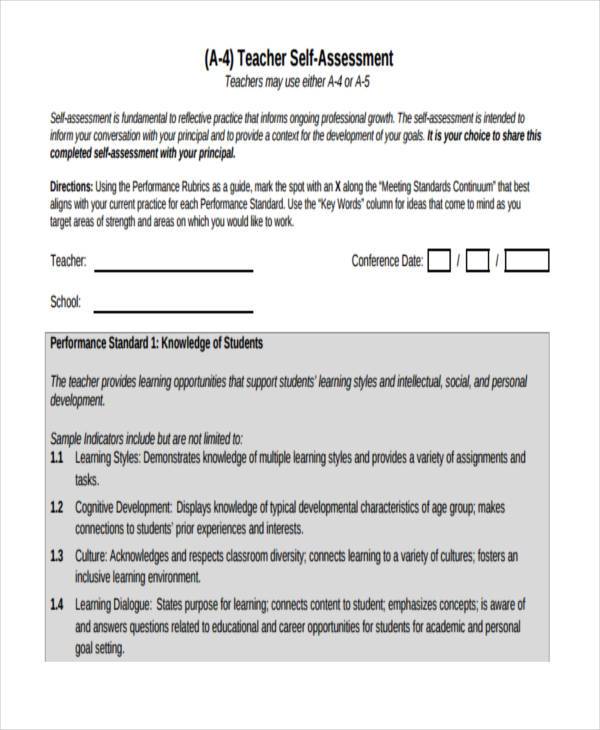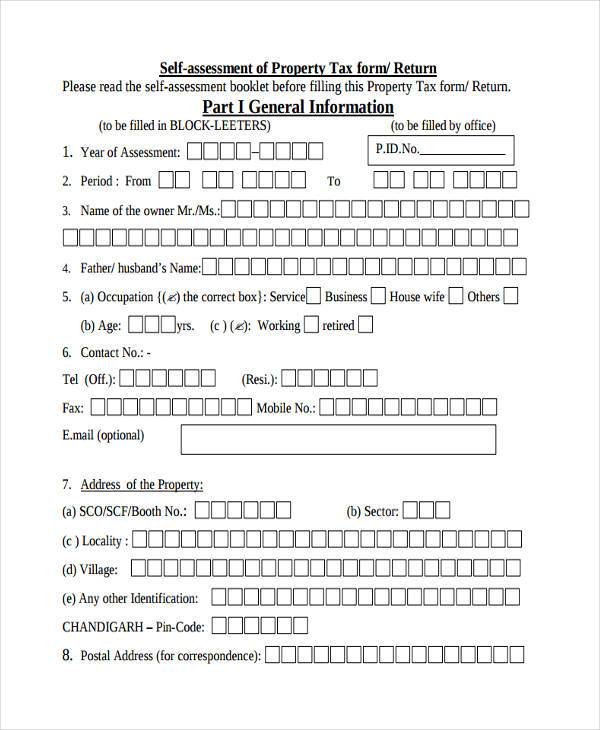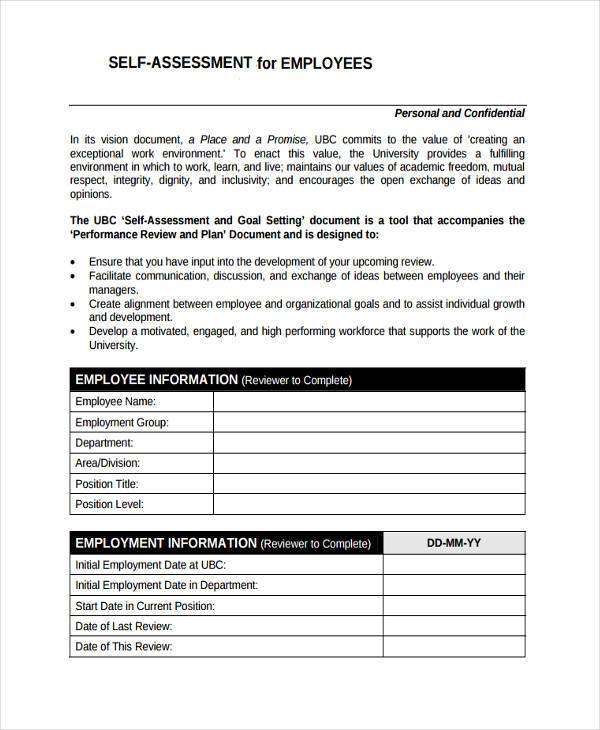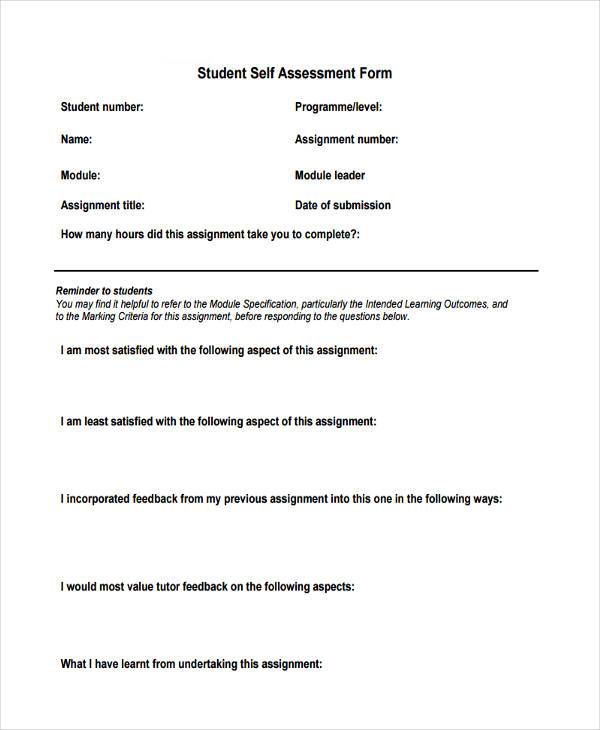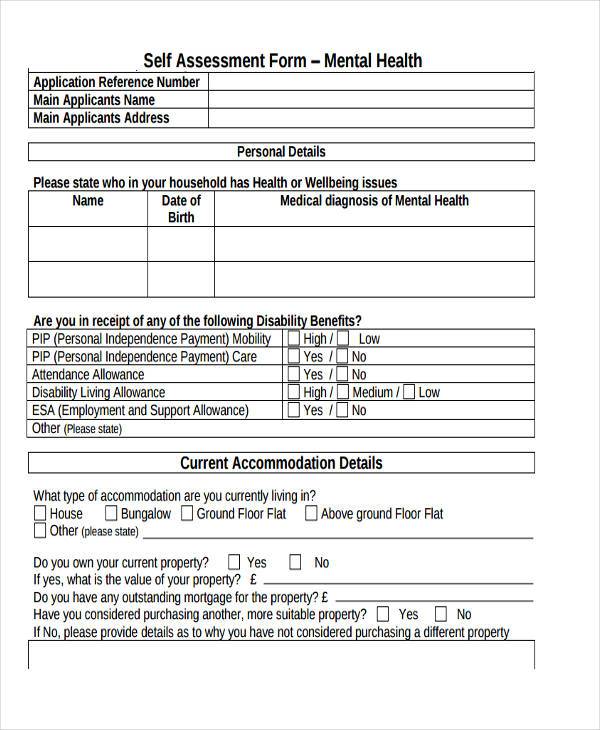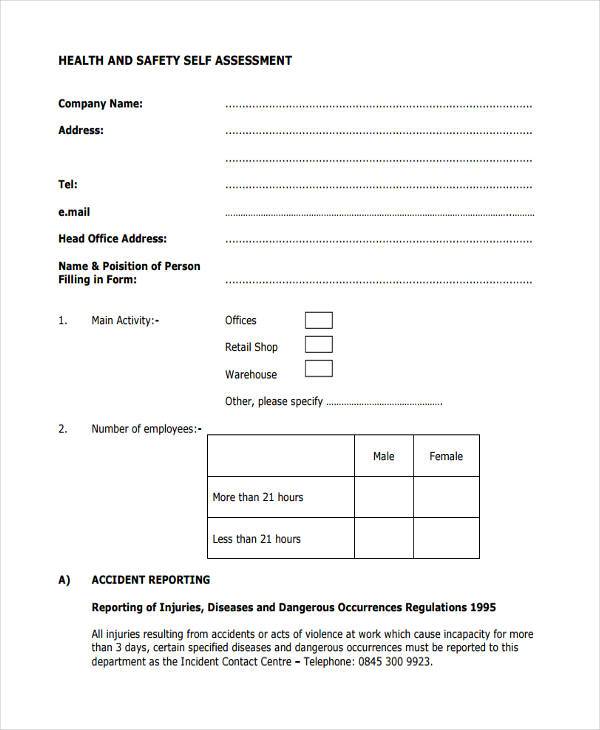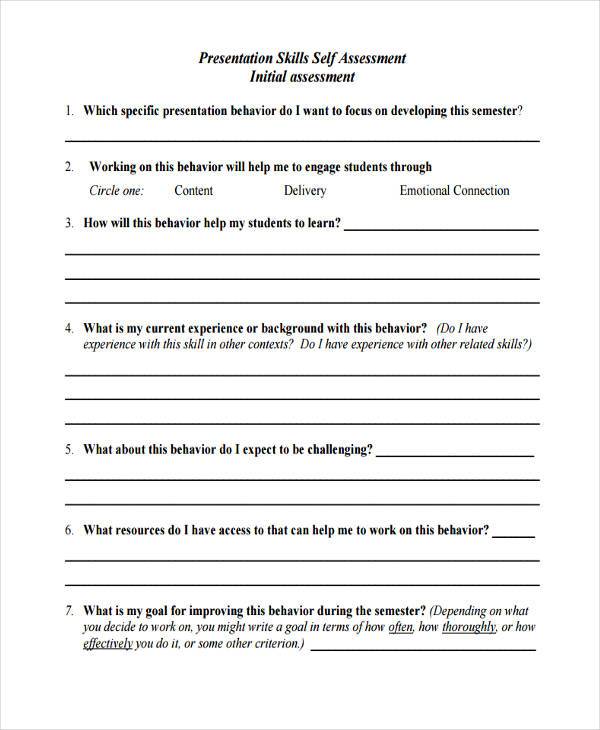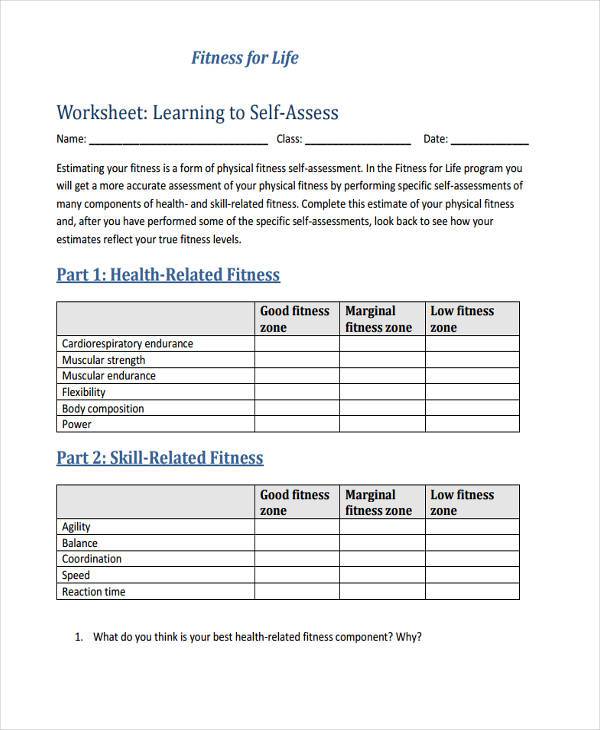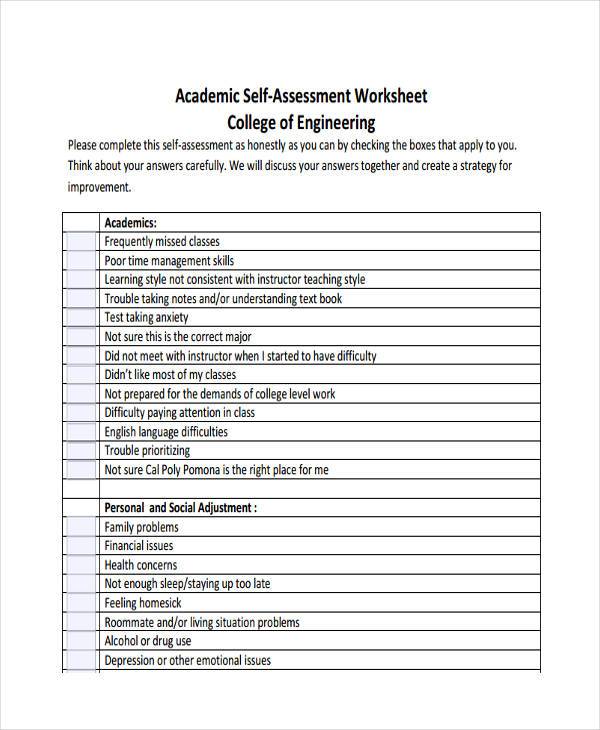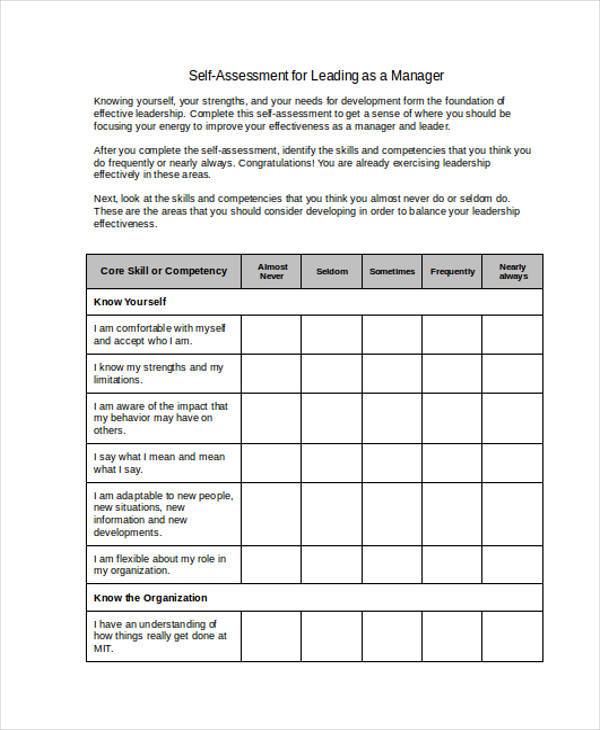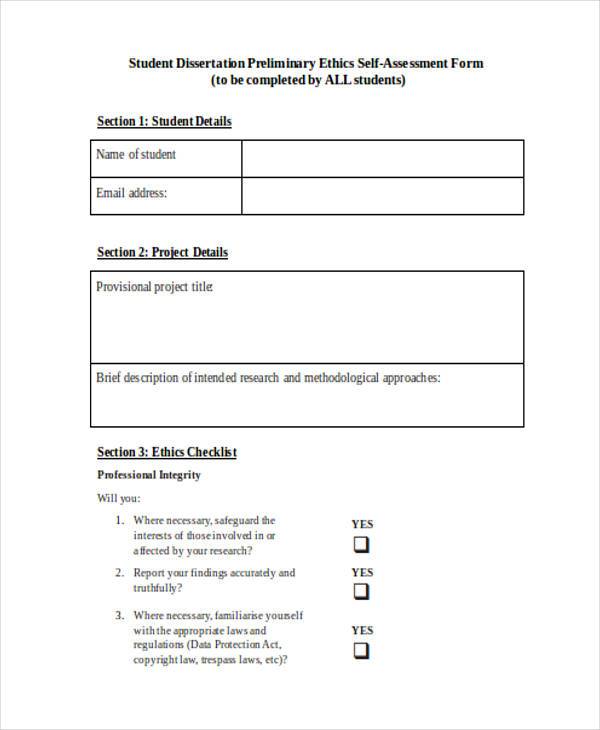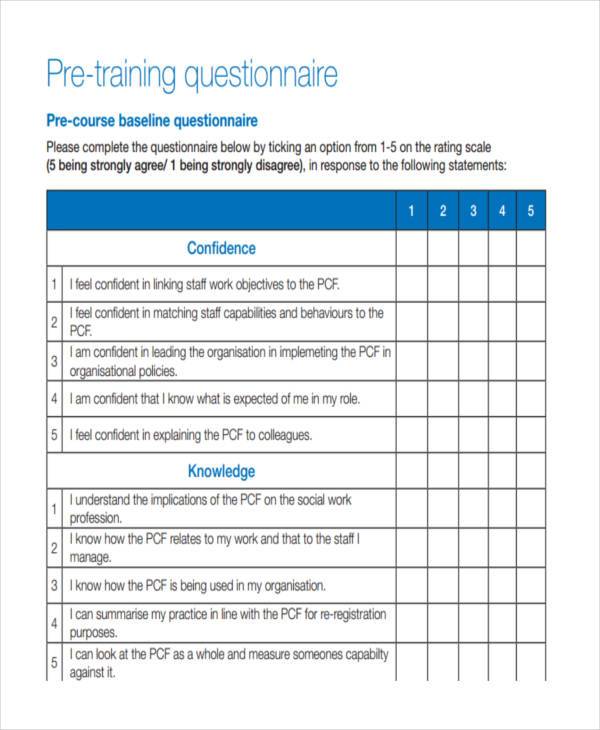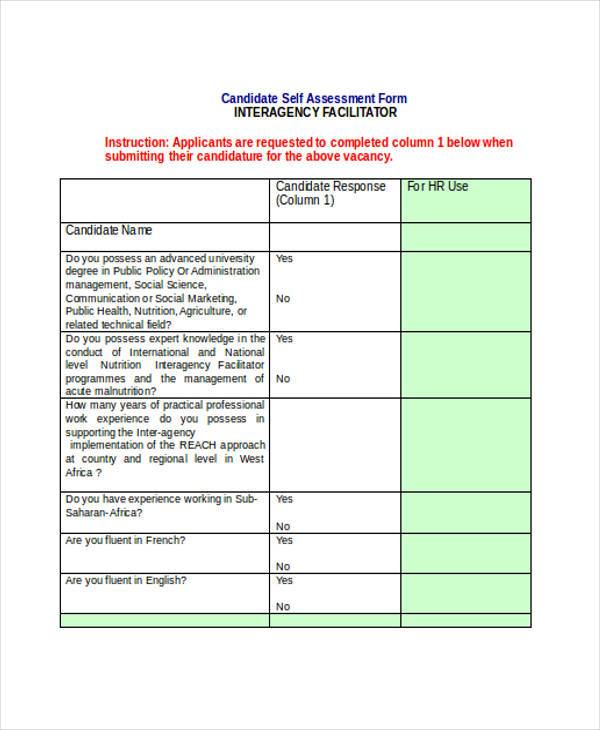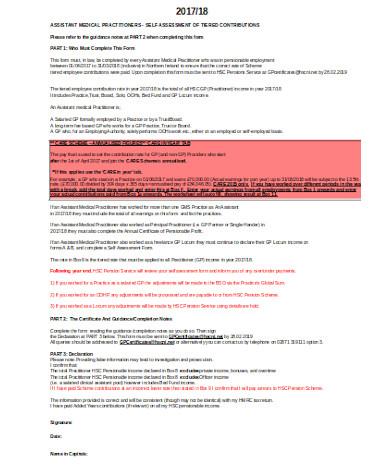A Self-Assessment is the act of evaluating one’s actions, attitude, or performance in order to determine if a set level of goals and objectives have been achieved by an individual. Self-Assessments are a crucial tool for self-development, and these provide critical and constructive feedback that is related to a person’s level and quality of performance.
A Self-Assessment can be conducted in any type of environmental setting that requires the constant improvement and development of a person’s performance. More often than not, schools and workplaces utilize the process of evaluations and self-assessment to calibrate the quality of their staff or their students. Self-assessments require careful reflection and have to be done from an objective perspective to provide an unbiased opinion of one’s strengths, weaknesses, and abilities.
Employee Performance Self-Assessment Form
Free Employee Self-Assessment Form
Student Self-Assessment Form
Student Success Self-Assessment Form
Student Behavior Self-Assessment Form
Student Conference Self-Assessment Form
Student Finance Self-Assessment Form
Income Tax Self-Assessment Form
Income Tax Return Self-Assessment Form
Income Tax Self-Assessment Form in PDF
Making an assessment about yourself can sound as simple as writing a reflection. However, when you are actually ready to write down the evaluation, you will find that it somehow poses a challenge. Creating a Self-Assessment can be nerve-wrecking, especially if you want to provide an objective evaluation of yourself but you also want to highlight all your exemplary work accomplishments. You also do not want to appear vain or conceited.
Because your Self-Assessments can either make or break your performance evaluation and your superior’s impression of you, you might want to consider careful and thorough reflection of what you want to highlight and what you want to improve on. Below is a step-by-step process on how to make a stellar Self-Assessment:
Ditch the Shy Act and Flaunt Your Strengths
Now is your time to shine and highlight your accomplishments. Do not feel embarrassed to showcase your skills and talents and enlighten your superiors on how your efforts have made a positive and dramatic impact to the company as a whole. If you do not mention your achievements to your superiors, chances are your efforts might prove to be futile and go unnoticed. An example of conveying this area to your superior may sound like this,
“Our metrics state that we are supposed to create 10 articles every day and I have been able to write 15 articles each day for the past 4 months, which I believe exceeds the required number and has dramatically helped increase our team’s productivity.”
Learn How to Critique Yourself
Highlighting your strengths may not be such a difficult task to do, especially when you’re creating a Self-Assessment. Humans were born to learn to love themselves and critique others. But what happens when you have to be the one to critique yourself? That might not be as easy as it seems.
Learn to properly reflect and ponder on areas that you need to improve on, be brutally honest with yourself, and learn how to admit your flaws and to own up to your mistakes. As an old adage goes, “Learn from your mistakes, it’s not how we make mistakes but about how we correct them that defines us.” It’s okay to go through some humps and bumps along the road as long as you are aware of the wrong that you did and you work on ways to improve yourself and not stumble into the same pit again.
One way to express yourself during a self-assessment is by using positive language or positive paraphrasing such as,
“Our metrics state that we are supposed to create 10 articles every day and I have been able to write 15 articles each day for the past 4 months, which I believe, exceeds the required number and has dramatically helped increase our team’s productivity. However, I also believe that I need to improve more on the grammar aspect of my writing. I sometimes incur lapses that tend to get my write-ups placed into the declined bin, and this greatly affects our team’s metrics and productivity. English and grammar training courses as well as coaching might help me to further improve my writing abilities.”
Preschool Teacher Self-Assessment Form
Sample Teacher Self-Assessment Form
Property Tax Self-Assessment Form
Property Tax Return Self-Assessment Form
Self-Assessment Form Example
Employee Self-Assessment Form Example
Student Self-Assessment Form Example
Health Self-Assessment Form
Mental Health Self-Assessment Form
Health and Safety Self-Assessment Form
Talk about Your Challenges
Of course, your supervisors do not expect you to be a superhero or a mutant. Human as you are, you may have faced some difficult and challenging obstacles to help you achieve your goals. This is your time to show some humility and be candidly open about the challenges that you have faced during the year, how you overcame those challenges, and the steps you plan to take in order to avoid similar circumstances.
Discuss Your Career Goals
Reflecting and evaluating your work performance will also allow you to reflect or ponder on your career goals and what you want to happen to you in the next years to come – career-wise, that is.
Through Self-Assessments, you will have bigger chances and opportunities to discuss with your superiors and communicate to them the plans that you have in your career, the ways in which they can help you strengthen your abilities and work on your weaknesses, as well as profiling you into teams or departments that allow you to optimize your abilities.
Self-Assessments should be taken as an opportunity to better understand yourself and to consider or analyze your options pertaining to your career such as:
- What are your strengths and weaknesses?
- What were you able to achieve in your work?
- What are your talents and values?
- Do you harbor the same values and principles as those of the company you work for?
- What is your dream job and why?
- Do you love your job? Why or why not?
- Are you passionate about the work that you do? Why or why not?
- What can you do to make your work more fulfilling?
Presentation Skills Self-Assessment Form
Self-Assessment Worksheet
Fitness Self-Assessment Worksheet
Academic Self-Assessment Worksheet
Self-Assessment in Doc
Self-Assessment for Managers
Preliminary Ethics Self-Assessment Form
Pre-Training Self-Assessment Form
Pre-Training Assessment Questionnaire Form
Interagency Self-Assessment Form
Interagency Self-Assessment Form in Doc
General Employee Self-Assessment Form
Be Professional
You have to keep in mind that your Self-Assessment says a lot about you. It reflects your character, your career goals, your talents, abilities, areas that you want to improve on, and ways in which you have created a positive impact on the company. Do not use Self-Assessments as an opportunity to bombard your superiors with comments about your colleagues’ faults or mistakes, or worse, use it as a chance to cuss at your boss.
Be a smart, savvy, classy, and well-cultured employee. If you aren’t one by heart, at least try to be one on paper. Remember, a well-polished and professionally crafted Self-Assessment says a lot about you as an employee and as a person.
Carefully Reflect On Your Evaluation
Don’t finish your self-assessment in just one go. Take the time that you need to make sure you are able to accomplish it clearly, properly, and objectively. You have to keep in mind that your Self-Assessment dictates your self-worth, let your supervisor see how much you appreciate yourself by coming up with a well-constructed and carefully thought-of assessment.
Documentation
Paperwork, paperwork, and more paperwork! Wherever you go and whatever work processes you conduct in the office, always make sure that you properly document them. Documentation is the key to accurate and carefully thought-of decision-making, and good decisions arise from proper management.
Human resources and supervisors typically use results and findings of an evaluation as a reference for bench-marking, promotion, or increasing an employee’s compensation and benefits. This is why it is important to keep a copy of your Self-Assessment carefully tucked into your files for safekeeping, in case you will be needing them for future purposes. It is also important that your supervisor or human resources has a copy of your evaluation.
Using a Self-Assessment Form, an Employee Self-Assessment Form, or a Work Performance Assessment Form can help you get a jump-start on knowing the type of document that you need to utilize for evaluating yourself.
Hundreds of Self-Assessment Forms can be downloaded online, or you can also download from our sample forms to help you save on time and money and save you from a massive headache of having to whip up a template from scratch.
Related Posts
-
How to Conduct a Risk Assessment? [ With Samples ]
-
FREE 4+ Sample Child Assessment Forms in MS Word | PDF
-
FREE 11+ Sample Financial Assessment Forms in PDF | MS Word | Excel
-
FREE 7+ Sample Health and Safety Risk Assessment Forms in PDF | MS Word
-
FREE 8+ Sample Supplier Assessment Forms in PDF | MS Word
-
FREE 7+ Sample Caries Risk Assessment Forms in PDF | MS Word
-
FREE 7+ Sample Management Risk Assessment Forms in PDF | MS Word
-
FREE 7+ Sample Infection Control Assessment Forms in PDF | MS Word
-
FREE 8+ Income Assessment Form Samples in PDF | MS Word
-
FREE 8+ Education Assessment Form Samples in PDF | MS Word
-
FREE 8+ Job Assessment Form Samples in PDF | MS Word
-
FREE 10+ Sample Vendor Assessment Forms in PDF | MS Word | Excel
-
FREE 11+ Assessment Forms for Teachers in PDF | Ms Word | Excel
-
FREE 10+ Nutrition Assessment Forms in PDF | Ms Word
-
FREE 10+ School Assessment Forms in PDF
